Iran's Foreign Minister Visiting Oman Discusses Yemen, JCPOA Talks
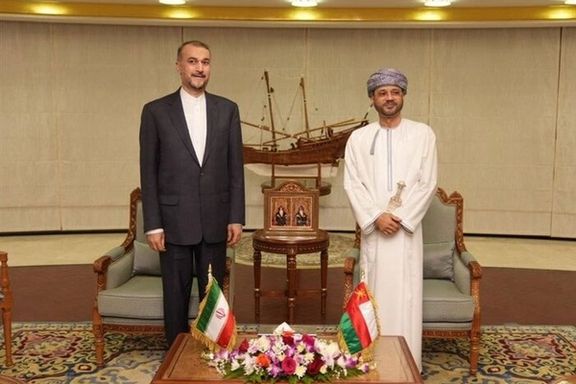
Iran’s foreign minister Hossein Amir-Abdollahian during a visit to Oman has discussed the conflict in Yemen and the status of Iran’s nuclear talks with the West.

Iran’s foreign minister Hossein Amir-Abdollahian during a visit to Oman has discussed the conflict in Yemen and the status of Iran’s nuclear talks with the West.
Iran’s official news agency IRNA reported Wednesday that Amir-Abdollahian met with Oman’s foreign minister Sayyid Badr Albusaidi and thanked him for mediation efforts by Sultan Haitham bin Tariq and the government of Oman “for their positive role” in JCPOA nuclear talks.
IRNA quoted Amir-Abdollahian as saying, “In addition to issues relating to expanding relations, I discussed regional issues with my Omani counterpart, as well as international problems, such as Palestine, Yemeni reconciliation and the situation in Sudan.”
IRNA commented that Oman has played an important role in Iran’s nuclear talks, “exchange of prisoners between Iran and the West”, and contacts between Iran and Saudi Arabia.
Oman has long played a mediating role between Tehran and Washington. First contacts in 2013 to launch nuclear talks were facilitated by Oman.
Meanwhile, Russian foreign minister Sergei Lavrov visiting the United Nations in New York, told reporters during a news conference on Tuesday that the revival of the JCPOA nuclear deal does not depend on Russia, China or Iran, indirectly accusing the United States for freezing talks.
The European Union presented a compromise agreement draft to Iran and Western powers last August, after 18 months of talks, but the United States accused Iran of stonewalling and presenting “extraneous” demands. In October, Washington said it is not focused on the talks any longer, demanding that Iran stop weapons supplies to Russia, among other things.
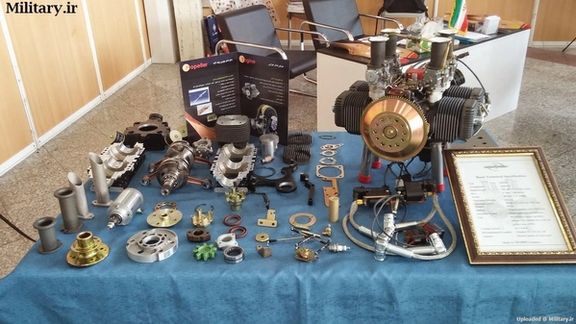
Two years since Myanmar’s military coup, widespread violence continues to escalate across the country, with growing indications and accusations of Iranian support to the junta.
Myanmar has been plagued by conflict and instability for decades. The country is home to multiple ethnic groups, many of which have been in conflict with the government. The situation has been further complicated when on Feb. 1, 2021, the Myanmar military, or Tatmadaw, deposed the democratically elected government led by the National League for Democracy.
The coup triggered countrywide protests that were followed by a crackdown leaving hundreds of civilians dead and several thousand detained.
As resistance to the junta continues, international research organizations, including the Center for Strategic and International Studies, have been suggesting that the Myanmar military has deployed a fleet of Chinese-made unmanned aerial vehicles to identify and locate potential targets.
Chinese drones have been used by the Myanmar military since 2015 to support counterinsurgency operations in the country’s restive north. But the unrest following the 2021 coup has increased demand for their use and for their spare parts, especially engines, which are widely believed to have been purchased from Iran.
“The engines were requested shortly after the coup, because some of the drones were showing the signs of wear and tear ... All the talks were with the Iranians,” Capt. Nyin Nyin Wai, a Myanmar army defector, told Iran International.
He said “there was a lot of back and forth” in the talks and it took a long time until the engines were delivered, but before leaving the military in December 2022, he saw documents confirming that Iranian parts had been ordered.
“I was in the meetings, and I saw the papers,” he said. “It was MD550.”
The MD550 is a drone engine that is reverse-engineered from a prototype designed in the 1980s by the German company Limbach.
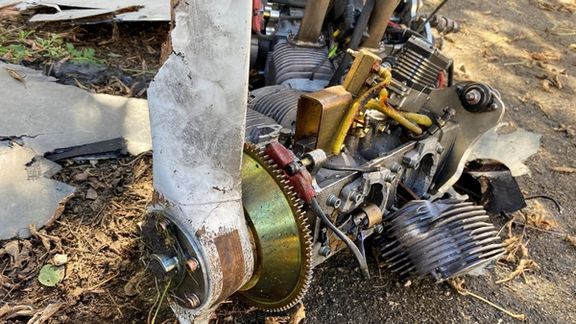
The Washington DC-based Wisconsin Project on Nuclear Arms Control and the US watchdog United Against Nuclear Iran believe it is produced by Iranian manufacturer Oje Parvaz Mado Nafar Company or MADO.
“It’s a strong claim. There are several credible sources,” UANI research director Daniel Roth told Iran International.
“It’s a little confusing because the original engine is made by Limbach (the L550E), and the MD550 is described as a ‘Chinese copy.’ The collected evidence suggests that it’s now probably made by both China and Iran — but mainly Iran.”
A January report by UANI, an analysis of the Iranian National Aerospace Exhibition showed photographs of the MD550 engine being displayed at the show in Tehran in 2012 — a year after MADO was established.
The company has been subject to US sanctions since October 2021.
According to the former army captain Nyin, the MD550 engines were supplied as replacement parts to the Myanmar Air Force, and repairs were conducted in the Meiktila Air Base Park in the Mandalay area of the country’s north.
It is unclear when exactly the first engines reached Myanmar from Iran, but early last year, data from flight tracker Flightradar24 showed Fars Air Qeshm — an Iranian cargo airline sanctioned by the US for carrying weapons and fighters to Syria — flying to Yangon from Mashhad, Iran’s second-largest city.
Since then, increased drone activity has been reported in the areas of Myanmar where the anti-junta opposition has been concentrated.
“Surveillance drones are used to learn where to target next,” Nyin said. “The focus was on Karen State, Sagaing Division, Mandalay area, Bago region.”
Rights activist Nicky Diamond from the Southeast Asia-based NGO Fortify Rights has experienced first-hand the surveillance drones flying in the mountainous areas of the eastern Karen State in March and June 2021.
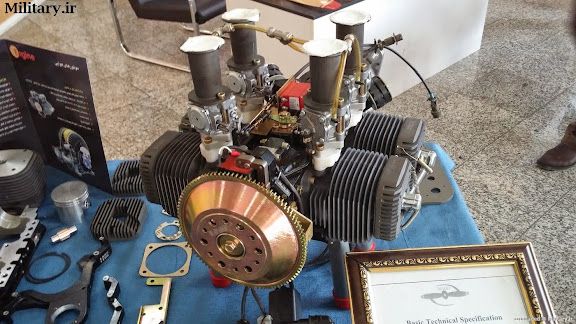
“China’s weapons and Iranian supplies are instrumental in oppressing revolutionary forces on the ground,” he said.
“Iran is under international sanctions, and it’s concerning that they are able to supply drones ... It’s a reminder that we need to do more to prevent the flow of weapons to conflict zones ... The issue of drone supply from Iran to Myanmar is a cause for concern and must be addressed to ensure the safety and security of the people.”
The situation in Myanmar is complex, and the Iranian regime’s support for the Myanmar junta is just one of the many issues that complicate it further, with the potential to make the already volatile circumstances even more dangerous.
Myanmar’s government in exile, the National Unity Government, has been raising concerns about the junta’s ties with Iran, as likely to further destabilize the country and lead to more violence.
“We are aware of the military relations between Iran and Myanmar military junta since the coup,” Naing Htoo Aung, spokesperson of the NUG Ministry of Defense, told Iran International.
“Myanmar military’s campaign of terror against its citizens is being aided by a country like Iran, which not only makes the Iranian army or government accomplice but also poses a threat to regional and international security.”
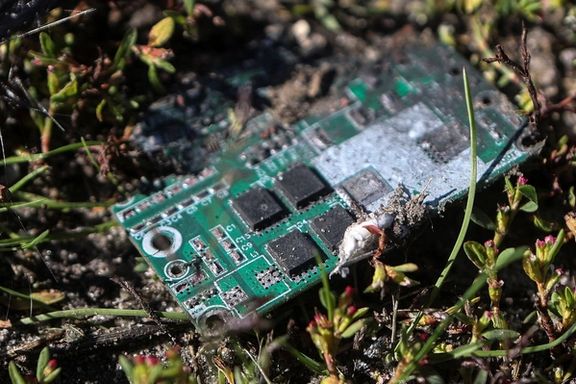
As the situation in Myanmar continues to deteriorate, the international community faces a difficult decision on how to respond to the junta’s actions. Until now, however, the UN has not imposed a binding arms embargo on Myanmar, despite calls from rights groups and the government in exile.
Special Envoy of the UN Secretary-General on Myanmar Noeleen Heyzer briefed the UN General Assembly on the situation on March 16, saying that the “violence continues at an alarming scale” and that “heavy fighting has spread to areas previously unaffected by conflict, putting more civilian lives at risk and further complicating humanitarian operations delivering lifesaving assistance.”
Heyzer said that 17.6 million people — about a third of the country’s population — are in need of humanitarian assistance, more than 1.6 million are internally displaced.
“Arms embargo to Myanmar military junta would be ideal to deter the junta’s killing of innocent citizens,” Naing Htoo Aung said.
“If arms embargo is not possible, then the UN and international community should seek to provide effective support to the resistance side to help them defend their lives.”
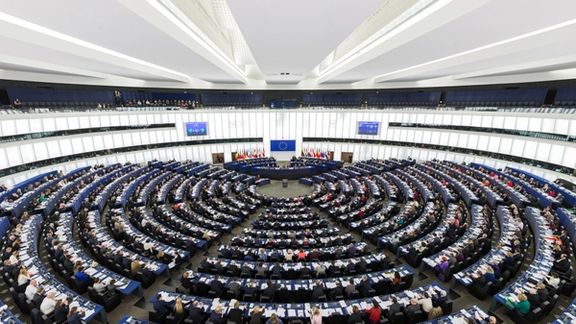
The European Parliament is holding a three-day event in solidarity with the Iranian people in their struggle against the Islamic Republic for freedom and democracy.
The first day of the European Parliament Solidarity Days was held on Tuesday jointly by the Subcommittee on Human Rights and the Committee on Foreign Affairs in coordination with the European Parliament's Delegation for Relations with Iran to exchange views on "How to support Human Rights, Freedom and Democracy in Iran".
Udo Bullmann, Chair of the Subcommittee on Human Rights, said during the session, “We stand in full solidarity with the courageous people of Iran who risk their lives by taking the streets and speaking out for freedom and justice again, and again and again. We must not and will not let them down. Tyranny will not win. We stand up for dignity, democracy and human rights, we stand with the people of Iran.”
European lawmakers say the event’s objective is to explore ways to support human rights, women, and civil society in Iran with a large spectrum of Iranian guest speakers, and to reflect on challenges and prospects for Iran's democratic movement. However, the list of the speakers on the first day drew controversial reactions online as some of the participants were labeled as regime apologists by some social media users.
Women's rights activist and writer Mansoureh Shojaee, journalist Mahdieh Golroo, Sociology of Gender Researcher Fatameh Karimi, and former political prisoner Sattar Rahmani as well as Ardeshir Amirarjomand, a senior advisor to dissident former prime minister Mir-Hossein Mousavi – were some of the speakers.
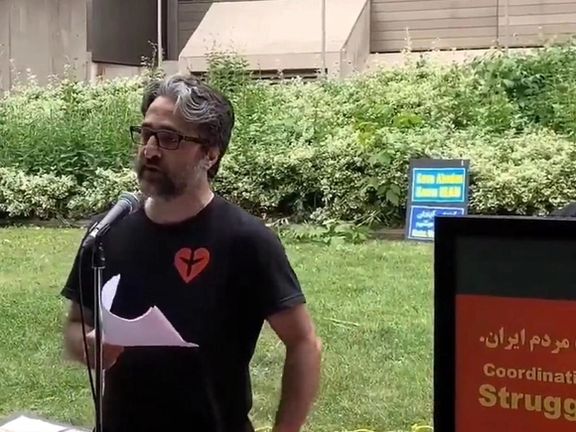
Also among the participants was Canada-based opposition figure Hamed Esmaeilion, whose recent resignation from the Alliance for Freedom and Democracy in Iran has sparked bitter arguments between constitutional monarchists and his supporters.
He told Iran International after the session that he focused his remarks on how to help “the Iranian revolution” on three main topics: providing uncensored internet, helping the affected families and protesters – free or detained -- inside the country, and setting up a fund to support striking workers.
He added that the designation of Iran’s Revolutionary Guards as a terrorist organization was also among the topics discussed during the session. Blacklisting the IRGC has been one of the main demands of the Iranian opposition as it is the regime’s hand in cracking down on dissent inside the country and handling Tehran’s proxy wars across the region.
One of the main hosts of the event is Cornelia Ernst, the chair of the European Parliament's Delegation for Relations with Iran, which has maintained a regular dialogue with the Islamic Republic’s parliament and its mandate is to further promote dialogue and “mutual understanding” with the Iranian parliament. Such a mandate seems to be against the Women, Life, Liberty movement, which has engulfed Iran since September 2022, when the death in custody of Mahsa Amini sparked the protests against the regime.
However, Ernst voiced opposition sanctioning the IRGC, expressing concerns that the designation would cut off relations and dialogue with the Islamic Republic and may pave the way for the regime to become another North Korea, which the European Union does not want.
Hanna Neumann, the representative of Germany in the European Parliament who has been very active in supporting the Iranian protest movement especially since September 2022, also spoke during the session. She said the protests and the ensuing crackdown have shed light on the atrocities of the regime.
“Thanks to the protests, everyone knows now how brutal this regime is, how it is beating, raping, executing its own people,” she said, noting that “it is quite clear that the regime is impossible to reform and that it is a big threat to its own people, to the region and to the world as a whole.”
Other MEPs also called for the freedom of hundreds of political prisoners, especially women, marginalized minorities, and torture survivors.
They also reiterated their call for the EU to add the IRGC to its list of terrorist organizations, three months after a plenary resolution adopted on January 19, 2023.
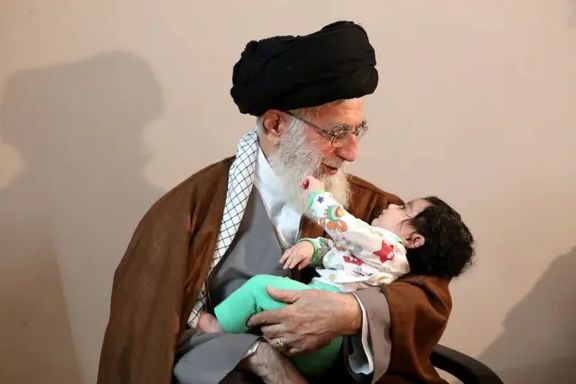
University professors who encourage their students to have children, are set to be promoted, according to Iran's ministry of science.
A new directive obliges universities to support “pregnant mothers” or those students who already have children. All universities and colleges in Iran are obliged to run majors like ‘home and family management’ for female students and content against childbearing is banned.
In spite of the regime's efforts to encourage people to have more children, it has failed to achieve its intended results due to the dire economic situation.
As it aims to raise childbirth rates, the Islamic Republic recently adopted strict abortion regulations. The childbirth rate in Iran has been steadily declining over the past few decades. In the early 1980s, the fertility rate in Iran was as high as 7 children per woman. This rate has since dropped to 1.9 per woman in 2019.
The health ministry claims more than 100 cases of illegal abortion have been sent to the judicial authorities and the doctors' offices are sealed.
The ban on abortion in Iran has made women go underground and often unsanitary centers are used to terminate pregnancies causing the death of many and lifetime complications in others. Each year, between 300,000 and 600,000 abortions are performed in the country. In 2017, Iran's maternal mortality ratio was 16 deaths per 100,000 live births.
Iran’s Supreme Leader Ali Khamenei believes efforts to increase the country's population are among the most urgent duties and essential policies of the Islamic Republic as one of the Shia countries in the Muslim world.
Parliament passed legislation last year to outlaw tubectomy, vasectomy, and the free dispensation of contraceptives other than where pregnancy would threaten a woman's health. Medical experts have warned that the legislation would increase sexually transmitted diseases by restricting access to condoms.
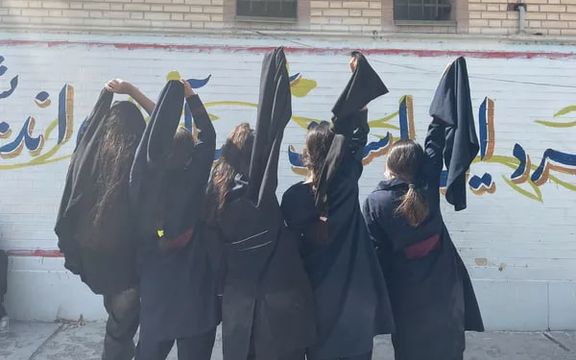
In its latest report, Human Rights Watch claims Iranian security forces have systematically murdered, tortured, and sexually assaulted children during the nationwide protests.
The rights group claims judges have barred children's families from hiring lawyers of their choice to defend them, and found Iranian authorities have arrested, interrogated, and prosecuted children in violation of legal safeguards.
Released Tuesday, the report details eleven cases of child abuse between September 2022 and February 2023. Children have been arrested and detained by security forces without informing their families.
In some cases, the students released from detention are barred from returning to school, or their families' social welfare has been cut off, forcing them to go to work.
Tara Sepehri Far, a senior Iran researcher at Human Rights Watch said: “Over the past seven months, the authorities have not hesitated to extend the coercive power of the state to silence even children.”
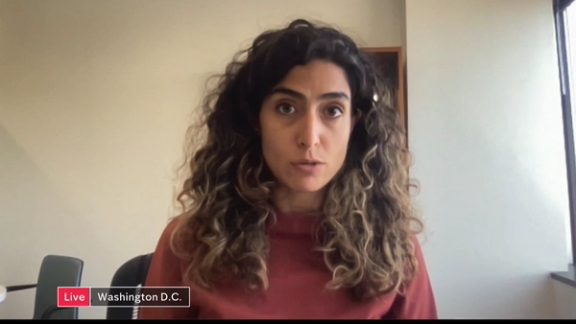
Detailing first hand accounts, one high school student said security forces set her clothing on fire, beat and whipped her, and pushed her onto a lit gas range during arrest. Another 17-year-old boy spoke of being brutally beaten and sexually assaulted.
According to the report, there have been numerous instances of torture, including the forcing of needles under a young boy's nails, the torture of two children to obtain information about their family’s whereabouts, and the torture of a 16-year-old who attempted suicide twice after being electrocuted, beaten, and sexually assaulted by interrogators.
Children injured by security forces have not been provided with medical care and their family members have been threatened to keep silent about the abuses.
Several rights groups, including Human Rights Watch, Amnesty International, and others, have documented widespread and violent repression of protests by the Iranian government, including the killing of children.
So far, well over 500 protesters -- including at least 69 children -- have been killed in regime crackdowns since the protests began in September, according to the Human Rights Activists' News Agency (HRANA).
Human Rights Watch called on the United Nations to act. In a statement, it said: “The United Nations Fact-Finding Mission on Iran should investigate these grave abuses against children as part of its broader reporting on the Iranian government’s serial human rights violations.”
Iranian law forbids prosecution and interrogation of children by anyone other than specialized children's prosecutors and youth courts. However, according to the report, a revolutionary court judge, a cleric, was co-appointed as a youth justice judge in one case involving 16 defendants, including three children.
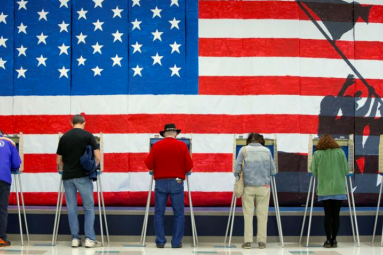
Iranian hackers gained access to a US government website set to report the 2020 elections results, according to US military officials.
The revelation was made by Major General William Hartman, head of US Cyber Command’s Cyber National Mission Force, who spoke for the first time of the incident, one of multiple attacks from foreign hackers during the presidential elections.
Speaking at the RSA cybersecurity conference in San Francisco, Hartman spoke of public concern that hackers may have rendered the website for displaying results unreachable or posted fake results, shaking public confidence.
However, he claimed that the Iranian group, known as Pioneer Kitten, was removed from the network before any damage was done to affect voting.
Hartman said the Iranian group was one of multiple foreign groups which had tried to disrupt the 2020 elections. In the same year, Iranian hackers faked emails supposedly from the militant far-right group, The Proud Boys, in order to threaten voters.
Six Iranians and a company called Emennet Pasargad were sanctioned by the United States in 2021 for interfering with the 2020 presidential election following the admission of the Biden administration that both Iran and Russia had interfered with the 2020 US presidential elections.
At the time, Alireza Miryousfi, the spokesperson of Iran's mission to the United Nations in New York, claimed on his Twitter page that "unlike America, Iran does not interfere in the elections of other countries."